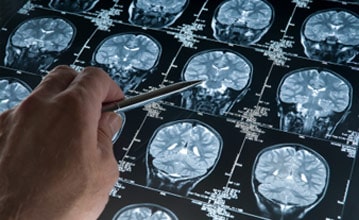Treatment for Dystonia in Lansdowne, VA
Persons with dystonia will experience involuntary muscle contractions that lead to repetitive twisted motions. Dystonia is a neurological disorder of the basal ganglia. This area of the brain controls some our movements by adjusting for speed and fluidity, hence why any dysfunction of the basal ganglia will result in sudden muscle spasms.
Dr. Seth Tuwiner provides comprehensive testing and treatment for dystonia at his office in Leesburg, VA. Learn more about your treatment options and call the Virginia Center for Neuroscience today at (703) 293-5244.
What Are the Signs of Dystonia?
This condition will typically appear in one area of the body first, and later begin to affect other regions as the dystonia worsens over time. It is not uncommon for symptoms of dystonia to differ from one patient to another, though most individuals will experience one or more of the following:
- Patterned body movements
- Muscle spasms that accompany a particular activity or position
- Corresponding movements on the opposite side of the body
Other symptoms that are common among those with dystonia but do not relate to muscle function are feelings of depression or anxiety.
What Areas of the Body Are Affected By Dystonia?
This neurological disorder can present itself in many ways. Some people only experience dystonia in a single spot, which is known as focal dystonia. If these involuntary movements are happening in multiple areas, then it is often a case of segmental dystonia. Finally, there is general dystonia, which occurs all over the body.
Typically, an individual with dystonia will notice involuntary muscle spasms in one or more of the following areas:
- Neck
- Jaw
- Vocal cords
- Tongue
- Hand
- Eyelids
- Forearm
Diagnosis of Dystonia
Mild movements will rarely send anyone directly to a neurologist. Most persons with dystonia will not receive an official diagnosis until the disorder has substantially progressed.
Once a patient visits Virginia Center for Neuroscience to discuss their concerns about the possibility of having dystonia, our specially trained physicians begin investigating their case by discussing which symptoms the individual is experiencing. They will also ask about any other known conditions that may relate to dystonia, such as:
- Huntington’s disease
- Prior stroke
- Congenital birth defect
- Parkinson’s disease
- Potential reactions to any medications
- Wilson’s disease
- A traumatic brain injury
Although there is no definitive test to prove whether or not a patient has dystonia, a diagnosis can be rendered by an experienced physician after they assess the patient and their current condition. The best thing that you can do during this preliminary assessment is to be as open and honest about your symptoms and medical history as possible so that nothing is overlooked.
Schedule an Appointment in Leesburg, VA
If you are experiencing involuntary muscle movement, schedule a consultation with Dr. Tuwiner today by calling (703) 293-5244.




